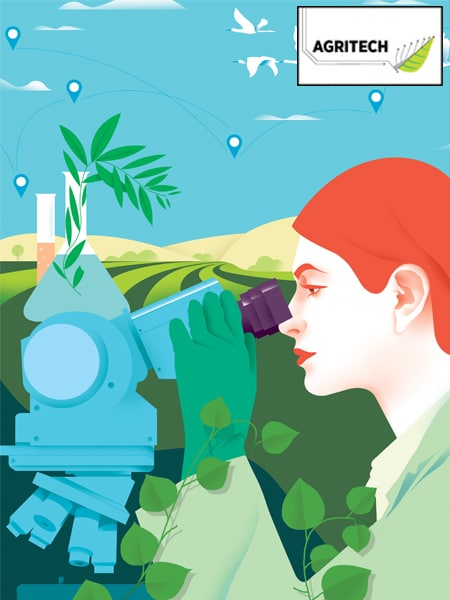
How to reshape the future of Indian agriculture
Innovation in agrifood life sciences is the need of the hour. The fledgling ecosystem needs to be revitalised with talent and capital, Mark Kahn, managing partner and cofounder, Omnivore, writes
 Agrifood life sciences (AFLS) as a sub-sector of agritech is yet to experience the same boom in entrepreneurship and funding.
Illustration: Sameer Pawar
Agrifood life sciences (AFLS) as a sub-sector of agritech is yet to experience the same boom in entrepreneurship and funding.
Illustration: Sameer Pawar
Less than a decade ago, channeling capital into India’s now-thriving agritech sector was a Herculean task. Before the ubiquity of mobile data and smartphones across rural India, venture capital (VC) investors focussed on urban themes, including ecommerce, e-grocery, and restaurant delivery. Around 2016, when these categories consolidated around a few unicorns, mainstream VC investors began exploring B2B themes and agritech popped onto their radar, which is appropriate given that around 25 percent of India’s economy is agriculture and agribusiness. As of 2022, India has the third-largest startup ecosystem globally and ranks third after the US and China in agritech funding. However, agrifood life sciences (AFLS) as a sub-sector of agritech is yet to experience the same boom in entrepreneurship and funding.
We think about agrifood life sciences as including four broad categories: Agricultural biotechnology, novel farming systems, bioenergy and biomaterials, and innovative foods. Agricultural biotechnology includes on-farm inputs for crop and animal agriculture, including hybrid seed breeding, genetics, microbials, and animal health. Novel farming systems include controlled environment agriculture (CEA), RAS aquaculture, insect protein, and algae production. Bioenergy and biomaterials include agri waste processing, biomaterials production, and feedstock technology. Finally, innovative foods refer to various forms of alternative proteins (plant-based, fermented, and cellular), as well as functional foods and other novel ingredients.
Why is AFLS so critical for India?
Indian agriculture faces a grim catch-22 situation in the coming decades, where there is an urgent need to increase crop yields to feed a growing population even as increased agri production depletes already declining water tables and soil health. Making matters worse are the advancing effects of climate change. Within a decade, Indian farmers will bear the full force of climate change, and digital technologies alone are insufficient to ensure a bright future in rural India.
Innovations in agrifood life sciences can play a critical role in tackling climate mitigation (reducing India’s GHG emissions) and climate adaptation/resilience (securing a future for India’s farmers). We are also moving towards a more protein-intensive future alongside rising concerns for animal welfare and environmental sustainability. Agrifood life sciences have the power to transform India’s bounty of millets and pulses into innovative plant-based proteins to meet global demand.
ALFS can even reinvent entire agricultural value chains, for example, replacing unsustainable ingredients like fishmeal with insect protein, creating a circular economy at scale. Finally, biological substitutes can be developed for chemical fertilisers and pesticides, simultaneously improving human and planetary health. There are innumerable challenges ahead for India, but agrifood life sciences can solve them with innovations.








